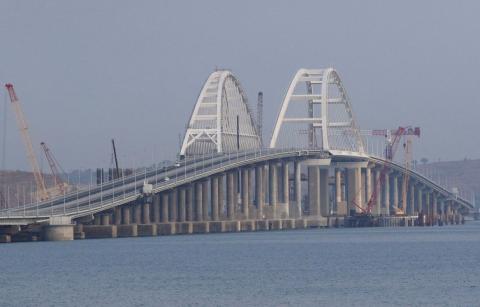Advertisement
EU slaps sanctions on six Russian groups over Crimea bridge
BRUSSELS (Reuters) - The European Union has imposed asset freezes on six Russian firms for their involvement in the construction of a new road-and-rail bridge linking Russia to the annexed Crimean peninsula, which the bloc says is illegal.
Russia seized Crimea from Ukraine in 2014 after Ukraine's pro-Russian president was toppled in an uprising. The West condemned the seizure as an illegal annexation and imposed sanctions on Moscow.
After the annexation, the Kremlin ordered the building of a $3.6 million bridge to link the peninsula to Russia.
The bridge, part of which was unveiled by Russian President Vladimir Putin in May, has drawn strong rebukes from the EU which says it is a further violation of Ukraine's sovereignty.
A statement from the EU Council, which sets the bloc's foreign and security policy, named six firms that will have their assets in the EU frozen. EU persons and entities will not be able to make funds available to them, it said.
The companies include three firms -- PJSC Mostotrest, SGM and Stroygazmontazh Most OOO -- controlled by billionaire Arkady Rotenberg, President Vladimir Putin's former Judo sparring partner. Construction firm CJSC VAD, engineering firm GPSM and the Zaliv Shipyard were also named.
"Through their actions they supported the consolidation of Russia's control over the illegally annexed Crimean peninsula, which in turn further undermines the territorial integrity, sovereignty and independence of Ukraine," the Council said.
Ukraine's foreign minister Pavlo Klimkin said he welcomed the additional sanctions.
"Important warning also for European businesses not to go down same slippery slope," Klimkin wrote on Twitter.
Russia criticized the sanctions, saying they targeted people living on the peninsula.
"This is a policy of undermining, directed against Crimea's residents," Russian Foreign Ministry spokeswoman Maria Zakharova was quoted as saying by TASS news agency.
Rotenberg brushed aside the sanctions in a social media post, saying work was underway to complete the railway section of the bridge.
"We're all proud of our work and if someone doesn't like it that's not our problem," a spokesman for Rotenberg quoted him on the Telegram messaging service as saying.
(Reporting by Robert-Jan Bartunek; Additional reporting by Gleb Stolyarov in Moscow; Editing by Raissa Kasolowsky and Peter Graff)



















Add new comment